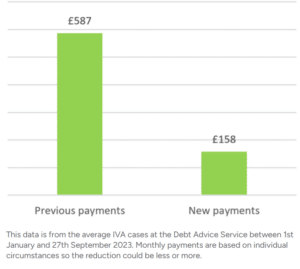Should I Pay or Ignore ACI Debt Collectors?
For free & impartial money advice you can visit MoneyHelper. We work with The Debt Advice Service who provide information about your options. This isn’t a full fact-find, some debt solutions may not be suitable in all circumstances, ongoing fees might apply & your credit rating may be affected.

For free & impartial money advice you can visit MoneyHelper. We work with The Debt Advice Service who provide information about your options. This isn’t a full fact-find, some debt solutions may not be suitable in all circumstances, ongoing fees might apply & your credit rating may be affected.
Are you concerned about dealing with ACI Debt Collectors? Maybe they’ve been in touch, and you’re not sure what to do next.
Don’t worry, you’re not alone. Each month, over 12,000 people visit this site looking for guidance on debt matters.
In this article, we’ll look at:
- Who ACI Debt Collectors are and why they might be in touch
- How to know if a debt collector is real in the UK
- What debt collectors can and can’t do
- Ways to lower your repayments or prove that a debt isn’t yours
- How to handle legal actions, complaints, and effects on your credit file
We know it’s tough to deal with money owed; some of us have been in your shoes. That’s why we’re here to help you understand more about your situation and learn how to handle ACI Debt Collectors.
Let’s dive in!
Why would Asset Collections and Investigations contact you?
Asset Collections and Investigations would likely contact you over money owed to one of their customers. When you’re in debt to a company and they fail to collect the outstanding, they could pass your details to Asset Collections and Investigations.
It’s then up to the debt recovery agency to contact you to recover the debt. As such, you could start getting phone calls, text messages, and several letters asking you to pay!
Each time the tone of a phone call or letter could be slightly more threatening. For example, debt collectors tend to send frightening payment demands that threaten legal action.
It’s a common tactic used to scare you into paying what’s owed!
What powers do debt collectors have?
A debt recovery company’s legal powers are limited. They have the same powers as the original creditor.
» TAKE ACTION NOW: Fill out the short debt form
For instance, Asset Collections and Investigations can ask you to pay, send you payment demand letters and threaten you with court action. They can also report you for defaults to credit reference agencies!
Which is exactly what the original creditor can legally do.
Does ACI Debt Collector have to prove the debt?
Yes. Absolutely they do. It’s not up to you to prove you don’t owe the money although any proof that you settled things does help. Especially when you know you have no outstanding debts!
You should send a recorded delivery letter to ACI telling them to ‘prove the debt’ is yours. It’s something they must do if they haven’t already done so!
Without sufficient proof, you can’t be made to pay. Moreover, a judge would not rule in a debt collector’s favour if they can’t prove you owe the money!
Don’t just accept ACI’s word for it either. Make sure you get written confirmation which could be an authenticated copy of a Credit Agreement!
How a debt solution could help
Some debt solutions can:
- Stop nasty calls from creditors
- Freeze interest and charges
- Reduce your monthly
A few debt solutions can even result in writing off some of your debt.
Here’s an example:
Situation
| Monthly income | £2,504 |
| Monthly expenses | £2,345 |
| Total debt | £32,049 |
Monthly debt repayments
| Before | £587 |
| After | £158 |
£429 reduction in monthly payments

If you want to learn what debt solutions are available to you, click the button below to get started.
When is a debt too old to enforce?
A debt is too old to enforce through the courts when it’s six or more years old. However, for a debt to be statute barred, the following must apply:
- You or a representative hasn’t admitted owing the money in the six years
- You or a representative hasn’t paid anything towards settling the debt in the six years
- A court hasn’t issued an Order to Pay against the debt (County Court Judgement)
You can’t be made to pay if the debt ACI is chasing you for meets the above criteria. As such, you should write to the debt collector telling them to stop contacting you.
If ACI continues to contact you, whether by sending letters, emails, texts or calling, you should file a complaint against them. Why? Because it could be seen as harassing behaviour which is unlawful.
You could also file a report with the Financial Ombudsman Service (FOS) if the debt collector continues to harass you!
What if ACI can’t prove the debt?
You can’t be forced to pay if ACI can’t provide solid proof you owe any money. In short, a judge would find it hard to rule in the debt collector’s favour if they can’t show you actually owe the money!
Thousands have already tackled their debt
Every day our partners, The Debt Advice Service, help people find out whether they can lower their repayments and finally tackle or write off some of their debt.

Natasha
I’d recommend this firm to anyone struggling with debt – my mind has been put to rest, all is getting sorted.
Reviews shown are for The Debt Advice Service.
What happens when you don’t respond?
Things escalate when you don’t respond to a debt collection agency. For example, you’ll be hounded more and more with calls, letters, emails and the like, all demanding payment!
If ACI is chasing a debt owned by the Perch Group, which the company is a part of, they could take you to court. In short, you’d face legal action!
Instead of binning a debt letter, it’s far wiser to reach out to ACI and discuss things. As mentioned, the debt may be too old to enforce, or they could be pursuing the wrong person.
If you don’t respond to a debt letter, you may never find this out. Plus, the problem doesn’t go away!
What legal action could ACI Limited take?
When you don’t respond to a debt letter and you refuse to pay a proven debt, ACI could advise a client to start legal proceedings against you. That said, if they are chasing a debt owned by Perch, things change.
In short, you could face court action that’s brought against you by Perch, which ACI is a part of.
A County Court Judgement could be registered against you and credit reference agencies would be informed of every default you make.
When you don’t respond to a court order to pay, a judge could instruct enforcement officers (bailiffs) to visit you to recover what’s owed.
A court-appointed enforcement officer has the power to seize your possessions!
What can debt collectors do?
A recovery company like ACI must abide by the CSA code of conduct and UK laws. For example, they must respect privacy laws and your rights as a consumer!
That said, a ACI can do the following:
- Contact you by email, phone, text or letter. They have the right to visit you at home if all other methods failTalk to you politely and discreetly about any money you allegedly owe to one of their customers
- Ask that you pay the outstanding sums of money to them directly rather than to their client
ACI can do all of the above without breaking the code of practice or UK legislation that governs debt recovery.
What can’t ACI do?
Debt collection agencies can’t act inappropriately or unlawfully when they contact you. For instance, they can’t do or say any of the following:
- Force their way into your property
- Pretend they are court-appointed bailiffs, now called enforcement officers
- Show you papers and other documents that look like a court has issued them
- Use legal jargon to confuse you
- Talk to a family member about the money you allegedly owe one of their customers
- Discuss things with your neighbours, friends or your employer
- Visit you where you work
- Seize possessions or clamp vehicles
- Pressure you into taking out more loans to repay the money you allegedly owe
- Harass or threaten you
Should you pay Asset Collections and Investigations straight away?
No. Although you may have to pay the amount owed in the end. However, first, you need to check a few things out because mistakes happen.
Maybe the debt’s been settled and you have no outstanding debts, or it’s partly paid!
Plus, the debt recovery agency could be chasing you for a debt that’s too old to enforce. Moreover, the debt might not even be yours to pay!
So, before you fork money over to ACI, you should write to the debt collector asking them to:
- Check the debt isn’t statute barred
- Prove you owe the money
That said, you can check whether a debt is statute-barred yourself by simply seeing if there’s a County Court Judgement registered against it. If you establish the age of the debt and find it’s too old to enforce through the courts, you won’t have to settle it!
What if you partially settle the debt?
If the debt is proven, and ACI accepts a partial settlement, a report is registered on your credit file. In short, other lenders can see you only paid a lower amount than the original debt.
What if you settle the debt in full?
If ACI agrees to a payment plan and you settle the debt over time by paying it off in instalments, your credit file will show the debt is ‘paid in full’. The same is true if the debt collector accepts a ‘full settlement payment’ from you.
How can you file a complaint against ACI?
When you’re unhappy with the way ACI handles things, you can complain directly to them. If, however, the debt collector doesn’t make things right and you’re still unhappy, then you can contact the Financial Ombudsman Service.
You have the right to file a complaint with the FOS and an investigation should be launched. If the ombudsman finds that the debt collector acted unlawfully, they could be penalised.
Moreover, you could receive compensation for their actions!
How do you contact ACI Debt Collectors?
I’ve listed ways you can contact ACI Debt Collectors in the table below:
| In writing by post | ACI, PO Box 123, Blyth, NE24 9ES |
| By telephone | 01253 531528 Monday to Thursday 8:30am – 6:00pm Friday 8:30am to 5:30pm |
| Via email | [email protected] |
| Website: | https://www.aciuk.co.uk/ |
| Complaints | https://www.aciuk.co.uk/complaints |

